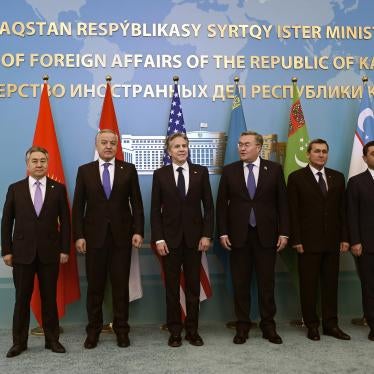(Brussels) – The European Union’s detailed assessments of Central Asian countries benefiting from preferential access to the EU market reveal major gaps in their fulfilment of human rights obligations.
Kyrgyzstan and Uzbekistan have been given EU market access under a special incentive arrangement for sustainable development and good governance: the so-called Generalised Scheme of Preferences Plus (GSP+). The scheme slashes a majority of EU customs duties to zero percent for countries that commit to implementing 27 international conventions on labour and human rights, environmental and climate protection, and good governance.
Yet, the Commission’s regular reporting and Human Rights Watch documentation show Kyrgyzstan and Uzbekistan to be in serious violation of most core international human rights treaties.
“As the EU aims to deepen relations with Central Asian states and build influence, it is a missed opportunity and undermines credibility if Brussels fails to apply the rules of its own instruments,” said Iskra Kirova, Europe and Central Asia Advocacy Director at Human Rights Watch. “The EU should make it clear to partners that serious human rights violations will not be tolerated and may jeopardize their lucrative trade benefits.”
On 21 November, the European Commission released its GSP+ monitoring reports on the countries’ fulfilment of obligations, the work of several years of scrutiny.
The report on Kyrgyzstan documents a host of measures taken by the government from 2020 to 2022 that curtail the operations of NGOs and journalists. The report describes an environment where journalists, civil society activists, and human rights defenders, “face pressure and intimidation for expressing their opinions, including threats of violence and harassment and targeted prosecutions.”
The report highlights multiple areas of concern, including draft legislation against foreign-funded NGOs, a Russian-style anti-LGBT law, draft media laws allowing wide interference with media content, as well as criminal cases, detentions, and expulsions from the country against activists and journalists.
These practices are in blatant violation of the International Covenant on Civil and Political Rights (ICCPR) and core antidiscrimination obligations under GSP+. But while the report speaks of a “negative trend” in implementation it fails to send a stronger message to Kyrgyz authorities that they need to take decisive steps to ensure compliance. This is contrary to calls in a recent resolution by the European Parliament to reassess the benefits given Kyrgyzstan’s failure to meet commitments.
Kyrgyzstan has backtracked on previous progress in even less politically sensitive areas. For example, it removed domestic violence from the Criminal Procedural Code, making it only an administrative offence. Domestic and gender-based violence remain significant problems in Kyrgyzstan, as the report notes.
The Commission’s report also mentions last year’s deadly border conflict between Kyrgyzstan and Tajikistan, but fails to mention credible evidence of apparent war crimes committed by both sides, as documented by Human Rights Watch, and a persistent lack of accountability for perpetrators.
This year is the Commission’s first GSP+ report on Uzbekistan after the country was granted trade benefits in 2021 on President Shavkat Mirziyoyev’s promise his government would build a “New Uzbekistan” and strengthen civil society and human rights. Two years on, the government has veered away from this reform agenda, with a “worrying backtracking […] particularly in civil and political rights” as the Commission acknowledges.
The report documents “serious challenges regarding Uzbekistan’s implementation of the ICCPR,” in particular the shrinking civic space and the state’s interference in the ability of independent civil society organizations to register and operate, the jailing of bloggers and journalists, the high number of people imprisoned on politically motivated charges, as well as stalled legislative reforms of the NGO and criminal codes. “Decisive steps” are rightly expected of Uzbekistan in this regard to ensure compliance with GSP+ requirements.
On other issues, the Commission’s report is prematurely optimistic, noting for instance the tackling of torture and ill-treatment in detention as an area of progress. While the government has made important promises in this regard, torture and ill-treatment, and impunity for these crimes, persists. The government has yet to introduce an internationally-compliant legal definition of torture, ratify the Optional Protocol to the Convention against Torture (OPCAT) or receive a visit by the UN Special Rapporteur on torture.
The report makes only muted reference to last year’s violent crackdown on mostly peaceful protesters in Uzbekistan’s autonomous region of Karakalpakstan that goes against obligations to protect the right to peaceful assembly and the rights of ethnic minorities. Uzbekistan has yet to ensure accountability for the human rights abuses perpetrated during the protests during which at least 21 people were killed and hundreds were wounded.
This year Central Asia’s poorest country, Tajikistan, applied to receive GSP+ with an assessment mission by the EU planned in December. Tajikistan is in gross violation of the majority of core UN human rights conventions: its government has violently suppressed peaceful protests in the Gorno-Badakhshan Autonomous Oblast; dozens of members and leaders of banned opposition parties remain behind bars on politically motivated charges; according to media reports at least 700 NGOs were closed over the past 1.5 years. Human Rights Watch urges the Commission to insist on major human rights improvements before the country is considered for GSP+ status.
“The appeal of its single market provides the EU with a unique opportunity to use soft power to achieve change, and GSP+ was conceived to do precisely that,” said Kirova. “Yet, if Brussels does not insist on its partners’ obligations, it would not only damage the tool’s credibility but undercut its own global influence.”








